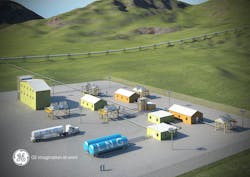Rethinking LNG as price of diesel plummets
With the price of oil having begun what he views will be “a long slow trend of decline,” Jon T. Gabrielsen, president & CEO of J.T. Gabrielsen Consulting, LLC, contends that fleet owners should think long and hard about whether trucks should be converting to run on liquefied natural gas (LNG) instead of diesel.
“There is substantial interest in the use of LNG [Liquid Natural Gas] for commercial transportation, including on-highway trucks,” Gabrielsen told FleetOwner. “This interest is has been driven by high diesel prices due to high oil prices.”
He recognizes that running on LNG instead of diesel can currently deliver a favorable return on investment, attributing that to the historically high cost of oil-- and therefore of diesel fuel.
But now that the price of diesel has dropped and more importantly, as Gabrielsen sees it, that decline is “likely to continue due to the long-term slowing in global demand while the supply of oil is increasing substantially.”
He said that the increase in supply that is bringing down the price of diesel is particularly driven by increased fracking of shale in the U.S. “One could argue that the price of oil would be lower already, if not for the ‘animal-spirt anxieties’ among the traders due to geopolitical unrest in multiple oil producing countries,” Gabrielsen noted.
“This major change in the diesel vs. LNG price dynamic is tremendously critical to those contemplating or already undergoing any conversion of their fleets to LNG,” he explained.
In his view the “conversion of portions of a commercial fleet to LNG entails very large investments with long payback periods. A beneficial LNG-to-diesel price relationship would have to be in place for 3 to 10 years or more for these investments to be favorable.”
Gabrielsen offers this yardstick: “If crude oil/diesel remains at $100/bbl. ($3.90/gal diesel) then ‘break even’ at a three-year simple payback can be achieved-- even if no improvements/reductions occur in incremental initial investment and liquefaction and logistics. But when the prices falls below that level, [conversion investments] enter into higher risk.
“What is a positive rate of return at $100/bbl of oil is a loser at $80/bbl,” he continued. “On September 12th, the benchmark for U.S. oil— West Texas Intermediate (WTI)—closed at $92.15. That was down 5% from a month ago and 15% from a year ago. And yesterday, Oct.15th, WTI was at $81.24.”
Further making his case, Gabrielsen said that “even if the price of oil was to decline no further, more than half of the benefit of conversion to LNG may have already been erased. And there is every reason to believe that the declining trend will continue.”
As to what should go into making the determination to switch to LNG or not at any given time, Gabrielsen said fleet owners should evaluate these three critical factors:
- Diesel Prices in Future. “What is the most likely future scenario for crude oil pricing and hence diesel pricing?”
- LNG Conversion Capital Investment Reduction. “How far can the incremental initial capital investment costs to equip trucks for LNG be reduced from their current costs?”
- LNG Fixed Cost Reductions. “How far can the fixed costs for liquefaction of incoming pipeline gaseous natural gas be reduced, thus lowering the breakeven price point line for LNG?”
Deciding whether or not to convert all or even just some of a fleet to LNG, as Gabrielsen puts it, “all comes down to what you believe the future prices for crude oil will be-- and thus what the future prices for diesel will be.”
He suggested that, given his analysis, a fleet might choose to “try out the LNG technologies, perhaps continuously keeping a small portion of one’s fleet on LNG to develop experience and optimize the use of the technology, all while closely watching the crude- oil pricing environment to determine whether or not to embrace LNG in a big way or not.”
Gabrielsen delves deeper into what he calls “the underlying drivers of the relative competitiveness between LNG and diesel for transportation fuel in a 23-pg research paper he’s authored, titled “An Analysis of Long-Run Economic Scenarios for LNG versus Diesel.”
He noted that his report includes an extensive “data walkthrough” on its way to “bracketing the oil and diesel price ranges at which it would be very favorable to convert to LNG to where it would be a significantly losing proposition.
“I generally open any paper with graphs that look over a very long period of time so that when the current environment is an aberration, it is blatantly clear,” Gabrielsen added. “And in this case, where we are heading back to normal as the price of oil plunges, it is blatantly clear that the last few short years [of high prices] were the aberration.”
A market-research and strategic consultant, Gabrielsen holds an M.B.A. in Finance and Economics from The University of Michigan and a B.S. in Manufacturing Industrial Technology from Eastern Michigan University
Gabrielsen’s LNG-vs-diesel research paper is available for purchase.
